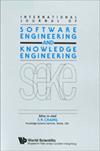Deep Tasks Summarization for Comprehending Mixed Tasks in a Commit
IF 0.6
4区 计算机科学
Q4 COMPUTER SCIENCE, ARTIFICIAL INTELLIGENCE
International Journal of Software Engineering and Knowledge Engineering
Pub Date : 2022-12-10
DOI:10.1142/s0218194022500711
引用次数: 0
Abstract
In Version Control System (VCS), a developer frequently uploads multiple tasks such as adding features, code refactoring, and fixing bugs, into a single commit and crumbles each task’s summary when writing a commit message. It causes code readers to feel challenged in understanding the developer’s past tasks within the commit history. To resolve this issue, we propose an automatic approach to generating a task summary to help comprehend multiple mixed tasks in a commit and developed tool support named Task summary Generator (TsGen). In our approach, we use the commit with a single task as input and identify the task to sort its elements sequentially. Then we generate feature vectors from each sorted element to train the Neural Machine Translation (NMT) model. Based on the trained NMT model, we generate the feature vector from each task of a commit with multiple tasks and put each of them into the model to provide the task summary. In evaluation, we compared the performance of TsGen with two existing methods for nine open-source projects. As a result, TsGen outperformed CoDiSum and Jiang’s NMT by 52.08% and 28.07% in BiLingual Evaluation Understudy (BLEU) scores. In addition, the human evaluation was carried out to demonstrate that TsGen helps understand mixed tasks in a commit and gained a 0.27 higher preference than the actual commit message.理解一次提交中混合任务的深度任务总结
在版本控制系统(VCS)中,开发人员经常将多个任务(如添加功能、代码重构和修复bug)上传到单个提交中,并在编写提交消息时分解每个任务的摘要。它使代码读者在理解提交历史中开发人员过去的任务时感到困难。为了解决这个问题,我们提出了一种自动生成任务摘要的方法,以帮助理解提交中的多个混合任务,并开发了名为任务摘要生成器(TsGen)的工具支持。在我们的方法中,我们使用带有单个任务的提交作为输入,并标识该任务以对其元素进行顺序排序。然后从每个排序元素生成特征向量来训练神经机器翻译(NMT)模型。在训练好的NMT模型的基础上,我们从包含多个任务的提交的每个任务中生成特征向量,并将每个任务放入模型中以提供任务摘要。在评估中,我们将TsGen与现有的两种方法在9个开源项目中的性能进行了比较。因此,TsGen在双语评估替补(BLEU)分数上比CoDiSum和Jiang的NMT分别高出52.08%和28.07%。此外,还进行了人工评估,以证明TsGen有助于理解提交中的混合任务,并获得了比实际提交消息高0.27的优先级。
本文章由计算机程序翻译,如有差异,请以英文原文为准。
求助全文
约1分钟内获得全文
求助全文
来源期刊
CiteScore
1.90
自引率
11.10%
发文量
71
审稿时长
16 months
期刊介绍:
The International Journal of Software Engineering and Knowledge Engineering is intended to serve as a forum for researchers, practitioners, and developers to exchange ideas and results for the advancement of software engineering and knowledge engineering. Three types of papers will be published:
Research papers reporting original research results
Technology trend surveys reviewing an area of research in software engineering and knowledge engineering
Survey articles surveying a broad area in software engineering and knowledge engineering
In addition, tool reviews (no more than three manuscript pages) and book reviews (no more than two manuscript pages) are also welcome.
A central theme of this journal is the interplay between software engineering and knowledge engineering: how knowledge engineering methods can be applied to software engineering, and vice versa. The journal publishes papers in the areas of software engineering methods and practices, object-oriented systems, rapid prototyping, software reuse, cleanroom software engineering, stepwise refinement/enhancement, formal methods of specification, ambiguity in software development, impact of CASE on software development life cycle, knowledge engineering methods and practices, logic programming, expert systems, knowledge-based systems, distributed knowledge-based systems, deductive database systems, knowledge representations, knowledge-based systems in language translation & processing, software and knowledge-ware maintenance, reverse engineering in software design, and applications in various domains of interest.

 求助内容:
求助内容: 应助结果提醒方式:
应助结果提醒方式:


